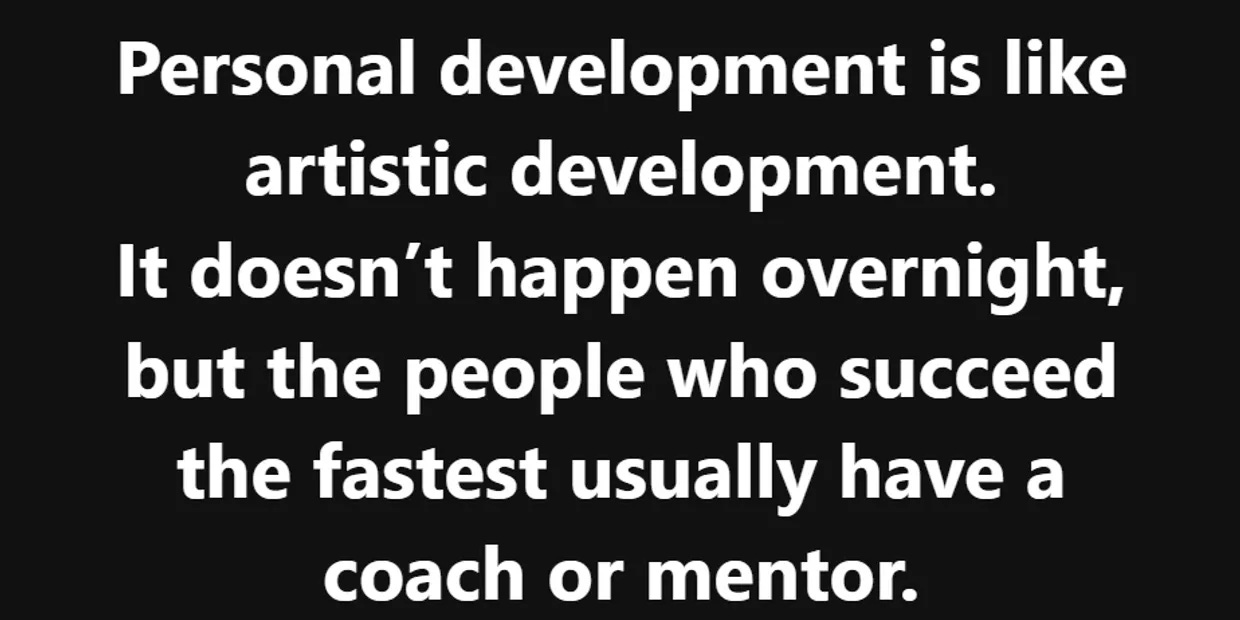I Learned I was a Nurturer
And I learned how I struggled with people pleasing, enforcing boundaries, honoring my worth, feeling guilty, and more...!
When I finally realized my dream of living in Chicago nine years ago, I started a private voice studio out of my home for the days I wasn’t driving 90 minutes or more to teach at Rockford University. But I ended up with what became a very unprofitable pay-what-you-can-afford business model where I just settled for whatever anyone thought they could afford to pay for private voice lessons. I had some students who would pay around $100 or more per lesson, and I had some who would pay as little as $20 per lesson, if even.
At the time, I thought I could afford to just take on whatever students I could get at whatever price they could pay. After all, many students were broke or drowning in student loan debt or were mostly doing gigs that didn't pay enough anyway, right? Meanwhile, even though I had my own student loans and financial challenges all the while I was doing some of the same kinds of low-paying gigs, I otherwise had just enough for a noticeably higher quality of life in a more desirable north-side Andersonville neighborhood with a beautifully remodeled condo and more.
While in retrospect, the better students for me were among the ones actually paying much more and the worst students for me tended to be among the ones paying less, I didn't realize it at the time because I was way too mentally preoccupied with the idea that I had to "check my privilege" and thus not charge too much.
A Chicago Reality Check for Performing Artists
Chicago is an amazing city to live in—I still regularly visit and I'll never rule out moving back—but a lot of aspirants in the arts move there only to find themselves struggling even more economically. Without a good-paying day job, unless you're singing full-time at the Lyric Opera, most of the performing work one can get as a classical singer will not provide enough income by itself to cover even the cheapest of living arrangements. And like everywhere else, there are also many "professional" gigs that will pay so little they are functionally of the pay-to-play variety.
And like everywhere else, it’s very easy to find yourself regularly surrounded by peers and colleagues of all ages who are broke or who go about life acting like or thinking they’re broke, i.e. mastering the "starving artist" mindset. And whether we intend it or not, we'll inevitably start thinking and behaving more and more like those we spend the most time with. Discussions in social situations related to artistic careers and money often tended to take on a hopeless, disempowered, or "woe is me" sort of tone; new ideas about new income-generating possibilities beyond the traditional matrix were often dismissed or criticized.
While I didn't have much other than my condo, my piano, my Lincoln MKC, and some savings, I was in a stabler economic situation compared to many. I often found myself feeling bad for having modestly more and wanting to help to my own detriment by picking up a few too many extra tabs, offering a few too many extra rides, and more.
Teaching private lessons is one of the more common lines of work that enables artists to otherwise afford to accept partaking in the race-to-the-bottom aspects of the performing industries. But I perhaps made the mistake of trying to just teach out of my condo in a part of the city that turned out to be too inconvenient to get to for most of my would-be students. I should have rented a studio space downtown or lived in a more affluent suburban area; most of the prospective students near me were aspiring actors and singers who were economically struggling.
As a teacher and singer, the "nurturer" in me somehow got the idea that it was a moral obligation of sorts to not get paid enough of what I should have been paid. It became my way of feeling like I was taking care of my students and serving my profession. I also perhaps thought I was avoiding the risk of being shamed for having some extra money at the time. It's as if I didn't want to find myself being branded as no better than say the rich man Dives who didn't help Lazarus, as told in the Book of Luke. It's an important parable—I even sang a solo about it in church!—and one where we have to be careful not to let it get us into simply thinking that having wealth is bad, but rather contemplate what it means to have wealth, how to earn it with integrity, and how we should use it to help move humanity forward.
How I Learned I was a Nurturer...
Six years ago, my first coach gave me the Sacred Money Archetypes® assessment. It's kind of like a Myers-Briggs type of test, but instead of characterizing one's overall personality, it’s designed to help someone understand how to characterize their relationship with money, get insights into their habits and internal subconscious beliefs, and take action steps accordingly.
Instead of a bunch of confusing acronyms you can’t remember (I think I’m INFP-A?), there are simply eight different archetypes with clearly descriptive names: Accumulator, Alchemist, Celebrity, Connector, Maverick, Nurturer, Romantic and Ruler. The top three combined often can encapsulate a pretty thorough picture of one's relationship with money.
"Nurturer" was at the top of my results (Celebrity and Maverick were the runners up—and maybe more of those in later posts!). Nurturer was also at or near the top for multiple friends, family members, and others, including most of my clients.
In short, this meant I and perhaps those I was around tended to run the risk of being overly generous, not setting healthy financial boundaries, and having a fear of asking for what one should be paid, among other challenges. It's as if my own sense of self-worth became focused too much on giving and too little on receiving. Many of my clients often had similar challenges!
With an inherent desire to be charitable at the expense of making the best business or financial decisions, I found myself becoming a hopeless people pleaser who wouldn't say no to almost anyone. Let's just say I learned a lot of things about financial planning, home buying and home remodeling the hard way. I definitely spent WAY more than I should have remodeling, but it did turn out better than I envisioned.
In addition to letting real estate agents, remodeling contractors, financial advisors, and others walk all over me and disregard my actual needs and wants, I was also enabling students, clients, and others to take advantage of my desire to please. After all, because I'm supposedly a more privileged person, I don't need to actually charge what my services are worth, right?
I became fascinated with the Sacred Money Archetypes® material as I worked on it with my first coach, and I was moved to want to get certified as well. No matter your income or your situation, it's an incredible tool to offer a perspective on the money blocks that can hold us back from our next level of success.
The more we can understand how money functions in our lives, how we perceive the values of goods and services, etc., the better we can become at bringing more money into our lives—from more of the right people for more of the right reasons! Send me a message or book an individual appointment if you're interested in taking the assessment and exploring how this work could help you and your business.
Taking Action as a Nurturer
I learned I had to address how I was sometimes acting like a sort of co-dependent martyr; I needed to make a serious change to stop the financial hemorrhaging. I set an intention to focus on how giving doesn't always have to be financial and can take many forms. I made a contract with myself to always try and find ways I can help people without spending money, giving money, or earning less money.
Rather than give away money or buy something outright for someone, while I wouldn't necessarily turn into some sort of Scrooge, I'd at least try and help them think of other resources to consider, or I would consider a fair and reasonable trade or barter. Moreover, instead of asking a student or client what they could afford, I made myself get comfortable with stating the investment amount with confidence, and in the event affordability could be an issue, I would be ready with ideas to help them earn or otherwise manifest the money.
As I've heard many coaches and mentors say and as I've read in many self-help books over the years, no one lacks in resources, they just need to learn how to be more resourceful. One assignment of sorts I had to create was to brainstorm ways I could help people without leaving money on the table. I originally wrote the list below as a social media post in response to people fretting over inflation.
10 ways to help those you serve without undercharging:
1. Help them get a job or a better-paying job. (The real help they might really need is simply for an influential figure like you to tell them it's OK to quit the current job and/or not have the impossible "perfect" artistic career that less than 1% have and earn their income in other ways.)
2. Help them realize other possibilities to generate more income. (Show them how to set up a Patreon or Substack, etc. their fans can subscribe to.)
3. Help them to start a GoFundMe or other crowdsourcing option.
4. Help them find and apply for grants and seek out other forms of aid.
5. Start your own GoFundMe or seek out other grants or resources to raise money for your own scholarship funds.
6. Have tiered, group, and/or digital offerings so more people can access your services at different price points.
7. Offer graduated payment plan options. (Give them time to get used to your regular fee and/or make up the difference at a later date.)
8. Offer them an opportunity to be of service to you. (Help them use their talents and expertise to grow themselves as well as your business.)
9. Ask them to be an ambassador for your business. (See if they can help get you referrals or sales in exchange for a fee reduction.)
10. Promise to hold a spot as you give them permission to come back later. (The help they might really need here is for a credible figure like you to tell them it is OK to wait until they are in a more stable financial situation so they are ready to not just invest the money, but also the time and effort they need to put into making the most of your offer.)
Remember, being in favor of getting paid more of what your offer is worth does not have to mean you’re against financial aid for those legitimately in need. We deserve better than to be the default financial aid resource before we even ask them to consider how resourceful they could be if they are serious about the opportunity.
PS - We’re two weeks away from the start of my next Grow Your Money Voice Elite Group Training! This 90-day opportunity offers a process and environment for clients to overcome the mindset and sales challenges and more so they can confidently earn more in their careers and businesses. If you go through this 90-day training experience, you along with other like-minded artists and entrepreneurs will find yourself empowered with:
🌟 Clarity of your life's purpose and business goals.
💵 Charging higher fees with newfound ease.
💡 Fresh income-boosting ideas.
🚀 Conquer any sales and marketing fears.
🏆 Grow into a recognized leader in your field.
💪 Boosted confidence in all areas of life and work.
💰 Permission to just get rich or richer already!
The next cohorts start on May 21 (and another option begins July 1)! Whether you are new to being in business for yourself, or you’re trying to figure out what your next level looks like, this opportunity could help you. It doesn’t take luck to change your life, just a desire to grow. Just check out my website if you’d like more info and to enroll. Send me a DM if you have any questions or if you need an alternative payment arrangement—the nurturer in me would be happy to see if we can work out a payment plan!















